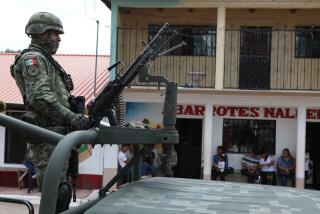TB carrier case called primer on lax security
The globe-trotting groom with a highly dangerous strain of tuberculosis whose travels last month caused an international health scare told a Senate panel Wednesday that he had no idea he was contagious.
“I don’t want this, and I wouldn’t have wanted to give it to someone else,” said Andrew Speaker, a 31-year-old Atlanta lawyer now in quarantine at a Denver hospital.
“CDC knew that I had this,” he said, referring to the Centers for Disease Control and Prevention. “I was repeatedly told I was not contagious, that I was not a threat to anyone.”
But even as Speaker testified via telephone before the Senate Appropriations Subcommittee on Labor, Health and Human Services, Education and Related Agencies, House members in another hearing room raised concerns about the potential implications of his case for U.S. security against terrorists.
“We dodged a bullet,” said Rep. Bennie Thompson (D-Miss.), chairman of the House Homeland Security Committee. “My question to the administration is: ‘When are we going to stop dodging bullets and start protecting Americans?’ ”
Noting that the Sept. 11 commission had found “a failure of imagination” among intelligence officials and that the 2005 Hurricane Katrina postmortems found “a failure of initiative,” Thompson said officials in this case “should have connected more dots.”
Officials testifying before both committees outlined an array of failures that several members of Congress said were a wake-up call for a serious bioterrorism incident.
Dr. Julie L. Gerberding, director of the CDC, told the Senate panel that health officials felt Speaker had disregarded their advice not to travel. “In retrospect, we realize by giving this patient the benefit of doubt, we put other patients at risk,” she said. “We don’t want to ever be there again.”
Once CDC officials had alerted Homeland Security to the situation, department lawyers conferred for two hours with lawyers from other agencies about how to put someone who was not a terrorism suspect on the airline no-fly list, Dr. Jeffrey Runge, the Department of Homeland Security’s chief medical officer, told the House committee.
At that point, officials began monitoring Speaker’s flight reservations back to the United States to make sure he did not change his plans. But he eluded them by making a second reservation to fly to Canada, said Jayson P. Ahern, assistant commissioner for field operations at Customs and Border Protection. That loophole, Ahern told the House committee, will be addressed as U.S. officials confer with airlines and other countries on how to better monitor international travel.
Finally, as Speaker and his bride crossed back into the United States via car from Canada, one border agent decided to wave them through at the border crossing in Champlain, N.Y. That agent, an 18-year veteran now on administrative leave, has said that he had received the alert from headquarters but that the patient did not appear ill.
“Apparently, he made the determination that the information was not accurate and determined that he did not look sick,” W. Ralph Basham, U.S. Customs and Border Protection commissioner, told the House panel.
Basham said the encounter happened about two hours into the agent’s eight-hour watch, adding that the issue was not one of resources or training but of bad judgment.
“The failure is inexcusable,” Basham said. “This has resulted in an awakening that we need to do a better job.”
Basham said rules adopted since the incident will require a second supervisor to clear anyone who is on an alert list. And Ahern testified there was a gap of more than six hours between the time the couple crossed the border and the time top officials in Washington learned about it.
“The blame game is not a good way to handle this,” responded Rep. Jane Harman (D-Venice). If Speaker had had a communicable disease like smallpox, she said, “we could right this moment have a major national health emergency.”
Committee members also objected when Runge said the media had hyped the dangers posed by Speaker, who has a form of tuberculosis known as XDR, for extensively drug-resistant. The World Health Organization describes XDR TB as “a grave public health threat.”
The patient was potentially a walking biological weapon, said Rep. Christopher Shays (R-Conn.), no less dangerous because he was determined to be married in Europe than he would have been if he had been intent on importing -- or exporting -- terrorism.
“This was T-ball, and we still struck out,” said Rep. Ed Perlmutter (D-Colo.). “This was not a war on terror, but boy, we didn’t do a very good job.”
--
joel.havemann@latimes.com
More to Read
Start your day right
Sign up for Essential California for news, features and recommendations from the L.A. Times and beyond in your inbox six days a week.
You may occasionally receive promotional content from the Los Angeles Times.






